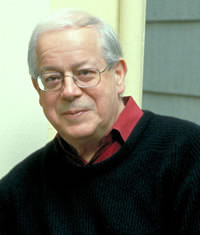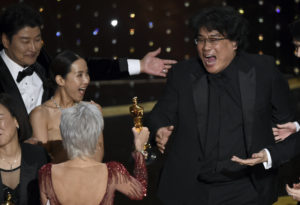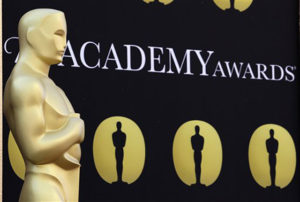David Thomson on the Oscar Best-Film Candidates: Worthy, but Not Great
The renowned film critic talks about this year's crop of small, issue-driven movies, and why "the liberal faction in Hollywood are much better at going to parties and raising money than actually making challenging films."
This is one of the most politically driven years in the history of the Oscars: Instead of biopics or sweeping disaster canvases, the Academy has selected five best film nominees — “Munich,” “Good Night, and Good Luck,” “Capote,” “Brokeback Mountain” and “Crash” — that have small budgets, small earnings and strong political messages. (Even “Capote” has become politicized in the press because its lead character is gay.) And this is not even to speak of films with nominations outside the Best Picture category such as “Paradise Now,” “Syriana,” “Transamerica” and “Sophie Scholl.” 2006 is Hollywood’s issues year, for better or for worse.
This Monday, on the eve of the 78th annual Academy Awards, renowned film critic David Thomson spoke with Sheerly Avni about this year’s nominees and what they may indicate about the future of film. Sheerly Avni: What did you think of this year’s Oscar contenders?
David Thomson: I liked quite a lot of them. I think they’re quite good examples of small independent pictures carefully made. It’s a fairly good group, I think. I just don’t think any of them is what I would call a knockout big-experience picture. They’re thoughtful. And I like that, I mean, please, don’t think I’m against it. And they all have an interesting, valuable, useful point to make. But I don’t think they are going to be remembered in 50 years’ time.
Do you also see concern that these films have not been blockbusters? For example, a film like “Brokeback Mountain,” which has not done huge business, particularly in the red states?
Very few of the movies up for nomination this year have cost very much, and very few of them have done the kind of business that Best Pictures are expected to do. In many respects those are good things. It’s a sign of progress, but it’s a kind of progress in which movies become smaller and smaller.
“Brokeback Mountain” has had a good audience so far, for an independent film, but it’s still a limited audience. If it wins — and I do think it will win — there will be people who will see it who would not have otherwise done so. They’ll sigh and say “OK, OK, I’ll go.” But it’s a film which cuts quite radically against the grain of popular American taste and, as you say, there are a whole lot of places where the movie has not been playing at all.
So you think “Brokeback Mountain” is a winner?
I suspect it will do very well in the Oscars. Enough people have convinced themselves that it’s a breakthrough attitude, though really it’s just a breakthrough in movie attitudes. The real life of people in this country will continue to be what it is, which is often difficult. It’s like saying that “Crash” would ease away the racial crisis in America. I think it’s useful for films to address these issues, but I don’t believe that film can solve them.
And did you like “Crash”?
I quite liked it, but I think it’s been overrated. I found it a little pretentious and I found the coincidences too much. It’s a kind of movie that Robert Altman and Paul Thomas Anderson have made far better. I thought it was heavy-handed and somewhat self-righteous. So no, I wasn’t a fan.
What is the relationship between these particular films being nominated and the current political climate?
If “Good Night, and Good Luck” can congratulate itself, which it sort of does, I think, about being an indirect oblique political statement about the world we live in, the world now, I think that is also a sign of a sort of helplessness — a cowardice still in dealing with situations.
I suspect that you and I and most of your readers would agree that we are nearly six years into an administration that could end our history, let alone be regarded as the worst in our history … and that the degrees of corruption in it, and degrees of alteration of reality, which I think is more important, are really ghastly.
If there’s a political consciousness that made that film, why isn’t there a film about what we’re going through now, that might really have offended and made trouble? And after six years they’ve had time to respond, and I think it’s still the case that the liberal faction in Hollywood are much better at going to parties and raising money than actually making challenging films. The personality of the Bush administration should have been the subject of some great satire, or something, by now. And it’s not really happened. So we hire Jon Stewart for the event, he’ll make a couple of anti-Bush jokes, and everyone will feel smart and superior for that — but we’re dealing with movies!
Two days after 9/11 I had the idea of a film of our so-called intelligent service. I mean, you could call it “These Are Our Intelligence Guys Who Are Simply So Stupid That They Do Not Know the First Thing About Looking After Us.” There’s ample evidence that has come out already which might furnish a background for a film like that. No one has taken it on though; no one has dared do it.
In your [Los Angeles Times] article, you wrote that this year’s nominees are “worthy, interesting, respectable,” but you went on to say, “Movies need to be wild, sensational, visceral, overwhelming.” What films have been made recently that were wild, visceral, overwhelming?
I thought that “Million Dollar Baby” had some of that quality last year…. There have been other films in modern times that did. It’s harder now. Film has moved away from being the real mass medium that it used to be. There were other films, I think that “Star Wars” and the first “Raiders” had it…. I think that Oliver Stone’s “Platoon” had it. So yes, there are some films from modern times. I think that David Lynch’s “Blue Velvet” had it, “The Exorcist” had it. These were films that just … took people over, you know?
What about more recently? In 2001, for example the Academy had to choose between “Gladiator,” “Crouching Tiger, Hidden Dragon” and “Traffic.”
Yes, this is very telling. “Gladiator” was a big picture. It had the confidence to say “I’m going to go to Ancient Rome, I know nothing about Ancient Rome and I could care less. I’m going to go and make a story that can move people now.” That’s the bigness of movie that I fear may be slipping away. “Crouching Tiger, Hidden Tiger” in a very different way had a real magic to it. And perhaps this year is just about that, this one year.
And is this the fault of the Academy?
The Academy trails along dutifully behind the industry. It’s not the responsibility of the Academy. I’m fond of the Academy: It does a lot of work that doesn’t get much notice, which is to honor and preserve film history. The weird thing about the Academy is that it is terribly vulnerable to the success of this one evening, because its income almost entirely comes from the show. What I feel is that the grip of the show is a bit less than what it used to be, and I’d hate to see that happen because of the other things that they do.
So you think that the grip of the show has slipped along with the grip of movies?
Well, one of the things we have to face is that not everyone goes to the movies anymore. And there’s a whole mass of reasons.
Let’s talk about those reasons.
Over a longish period of time the picture business has made it clear that they are aiming at an audience that is essentially 14-24 years old and male, because they find that to be the last reliable audience. Once upon a time those people felt that they were catered to, that there were plenty of films for everyone. You now have a feeling of this particular demographic edging out others, and you have the older generation in particular feeling that they are not comfortable with that young audience. They’re not comfortable with theaters that are half empty … which happens often.
Also — and this is something that is not talked about — sound is not good these days, the projection is not good, and you have to pay a lot of money. When I say old, I mean people 40 or older. People think, “I’d rather not see this latest horror film with eye-gouging and so forth…. I’d rather sit at home and get a good DVD and see if it’s as good as I remember.”
So the balance of what people are watching is shifting in the process. People who once went out now stay home. I have a hunch that this could become a landslide. We have far too many theaters for the size of the audiences, and we’re going to have a lot more people staying at home.
For a young couple with a child, it’s so much easier to stay at home than get a baby sitter, go to the theater, and risk seeing a film that you’re going to be disappointed by.
And I think that more and more people over the past 20 years have been increasingly disappointed by what the movies have to offer. Therefore, more reason to look at something they feel they can trust, an older film. And these older films stand up very well. There would not be the massive interest in DVDs … if those films didn’t still play well.
Also, with a DVD, especially on a small one, the experience is much more like reading a novel. You pause, you skip parts you don’t like, you re-watch scenes you do … you begin to think in chapters.
Exactly, you are in a situation where you are much more in control, and if you see a scene that intrigues you, you can see it again. It’s much closer to the experience of reading. In many ways, that’s good. But it’s not like the experience of seeing a movie like “Jaws,” in which you find yourself completely overwhelmed. And once upon a time that’s what going to the movies meant. I don’t mean to say that every week you got a feeling as profound or as big as that, but it did happen.
So seeing movies has become a private rather than a public experience.
Movies now are no longer a big shared event. One of the reasons the older movies still resonate so much now historically is because seeing them was a shared experience.
So now, would you agree that what’s replaced that is episodic television, waiting for what happens next week? So the water cooler makes television a shared experience?
Certainly, and in the case of a show like, for example, “The Sopranos,” it becomes part of the cultural currency. And people recommend DVDs to each other. But there’s not that same shared experience that goes back to the Golden Age of American film.
What do you consider the best film of the year?
The best film I saw last year, certainly in terms of films which would merit Academy Award nomination, would be “A History of Violence.” For me that would be the best film of the year. But I’m happy enough with [the idea of] Philip Seymour Hoffman’s winning. Reese Witherspoon’s competition is not intense, she’s paid her dues … and it’s a very tragic performance.
This year’s crop of films is very, very serious. Is there a sense of fun which is disappearing? Fun and comedy?
Yes — comedies and people associated with comedy have not done well. Preston Sturges never got nominated as a director. And in hindsight, you think “what are they doing?”
If you look back at the history of American film, one thing that stands out is the Academy’s inability to appreciate what comedy means to people.
I cannot say strongly enough: Movies discovered that people all over the world can laugh at the same film. That is prodigious.
Look for more coverage of Oscar’s Political Year tomorrow: The Tragedy of Comedy — a very different take on the Oscars from a director who was proud not to have been nominated for an Academy Award.
Your support matters…Independent journalism is under threat and overshadowed by heavily funded mainstream media.
You can help level the playing field. Become a member.
Your tax-deductible contribution keeps us digging beneath the headlines to give you thought-provoking, investigative reporting and analysis that unearths what's really happening- without compromise.
Give today to support our courageous, independent journalists.






You need to be a supporter to comment.
There are currently no responses to this article.
Be the first to respond.